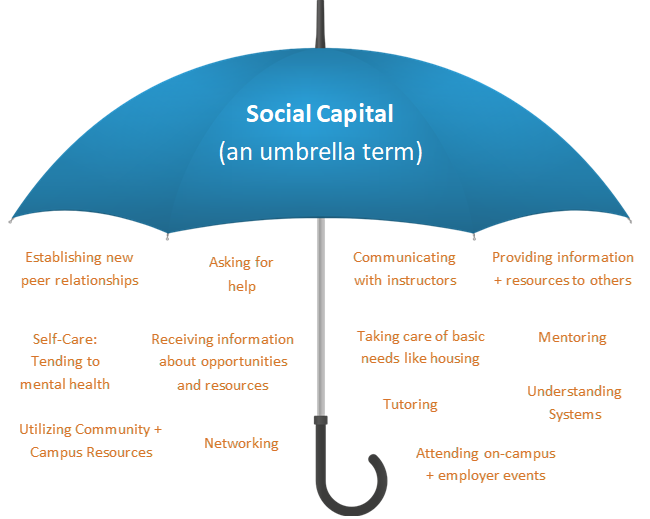Nov 16, 2021
The Situation
Project HELP (Health Education Laddering Program) was a multi-site program available at several community colleges throughout central Nebraska through funding from the national Health Profession Opportunity Grants program. The staff of Project HELP engaged TANF (Temporary Assistance to Needy Families) recipients and other low-income individuals in the education and training process, placing them on a career pathway for occupations that pay well and are in high demand in the healthcare industry. Staff members, Success Coaches, and Career Recruiters met regularly with students by phone and in person to help them navigate and overcome common challenges such as employment, transportation, childcare, and managing the demands of being a college student.
The coaches had been working with their students on a concept called “social capital,” defined by Bourdieu (1986) as “the information, support and resources available to an individual through connections and networks of relationships.” They wanted to strengthen communication skills students needed to conduct appropriate conversations with faculty and others in leadership positions. The coaches also expressed an interest in strategies to help students learn how to develop, utilize, and reciprocate in relationships.
Technical assistance provider, JBS International, engaged GLP in developing a four-week course focused on enhancing students’ knowledge and understanding of social capital in order to help them recognize and leverage their own social capital more effectively as they navigate toward educational and occupational training completion and attaining employment.

The Journey
The first step of our journey together began with achieving greater clarity on what each person meant when they spoke about the umbrella term, “social capital,” and identifying how students’ lives would improve if they were actively engaging in building and using their social capital. These benefits include students being more confident in interactions with their professors and employers, having more access to college and community resources, and gaining employment in the healthcare professions.
We created a matrix of tools and techniques, including several new tools created for coaches such as a “Relationship Map,” a “Help I’m Struggling worksheet,” and a series of 5-minute and 30-minute conversation examples using GLP’s 4A learning sequence. These allowed the success coaches to use the limited time they had with students to achieve the best outcome through a sequence that connects the students to their previous knowledge, encourages application of new knowledge, and sets a task to be completed before their next conversation.
Here is an example:
Introducing the Concept of Social Capital – Definition and Image
Anchor: Think about a time you had to ask someone for a favor. What did you do?
Add: There is a concept called social capital that can help you when you need favors. The definition of social capital is the information, support, and resources available to an individual through connections and networks of relationships.
Apply: When you hear that, what’s an image that comes to mind? Tell me more.
Away: Who can you call/text right now to help with something you need?
The Impact
Here are a few reports from the group regarding the impact of the social capital training:
- One coach noted that each of her graduating participants reported having a better understanding of their connections as well as where to go for help if a need arises.
- Another coach used the tool called “I’m Struggling” to create questions about financial aid, tutoring, public benefits, and employment assistance. It gave her a clearer picture of each student’s current social capital as well as ways they could grow it.
- The Project Director stated, “Our career coaches are talking more about social capital too and encouraging students to grow theirs. Their work was always based around connections, but now they have a term for it and can use the 5-minute conversations and 4A model to steer those conversations.”



